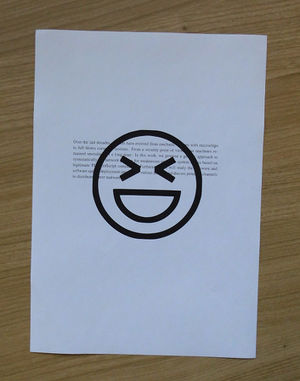| description |
|---|
One simple way to manipulate the appearance of printouts is to use overlays.
PCL has a documented function to put overlay macros on top of a document. Unfortunately, this feature is limited to the current print job and cannot be made permanent.
PostScript does not offer such functionality by default, however it can be programmed into by redefining the showpage operator which is contained in every PostScript document to print the current page. The attacker can hook in there, execute her own code and then call the original version of the operator.
Therefore she can overlay all pages to be printed with a custom EPS file. This hack can be used to add arbitrary graphics or fonts to hard copies of a document (It is possible to completely alter the appearance of a document by overlaying a blank page and then adding custom content).
Obviously, such an approach can only be successful if PostScript is used as printer driver and no StartJobPassword is set.
How to test for this attack?
Use PRET's cross or overlay commands in ps mode, then disconnect and print an arbitrary document:
./pret.py -q printer ps
Connection to printer established
Welcome to the pret shell. Type help or ? to list commands.
printer:/> overlay overlays/smiley.eps
printer:/> cross whoa "HACKED"
printer:/> exit
Even if an attacker can put an overlay above existing documents, she will not be able to alter specific values in the original document unless its exact structure is known. Sometimes ones does not only want to add custom content, but to parse and replace parts of the existing document.
The problem of replacing text in PostScript files can be reduced to the problem of extracting strings from the rendered document. This is not trivial, because strings can be dynamically built by the PostScript program itself. Hence, simple parsing and replacing within the document source code is not an option.
You can use a redefined show operator. The show operator accepts a string as input, which is painted to a certain location of the current page. By redefining the operator, text can elegantly be extracted. This approach can also be used for targeted searching and replacing in strings immediately before they are painted.
The approach is successful for LaTeX based PostScript documents which are directly sent to the printer while it fails for PostScript files generated by GIMP which instead of strings creates raster graphics of their representation. The same issue occurs for any document format – even PostScript itself – when processed by CUPS. Theoretically such language constructs could also be parsed and should be subject of further research.
How to test for this attack?
Use PRET's replace command in ps mode, then disconnect and print a PostScript document containing ‘DEF’:
./pret.py -q printer ps
Connection to printer established
Welcome to the pret shell. Type help or ? to list commands.
printer:/> replace "ABC" "DEF"
printer:/> exit
